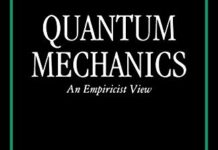
Ebook Info
- Published: 1991
- Number of pages: 560 pages
- Format: PDF
- File Size: 4.01 MB
- Authors: Bas C. van Fraassen
Description
After introducing the empiricist point of view in philosophy of science, and the concepts and methods of the semantic approach to scientific theories, van Fraassen discusses quantum theory in three stages. He first examines the question of whether and how empirical phenomena require a non-classical theory, and what sort of theory they require. He then discusses the mathematical foundations of quantum theory with special reference to developments in the modelling of interaction, composite systems, and measurement. Finally, the author broaches the main questions of interpretation. After offering a critique of earlier interpretations, he develops a new one–the modal interpretation–which attempts to stay close to the original Copenhagen ideas without implying a radical incompleteness in quantum theory. He again gives special attention to the character of composite, many-body systems and especially to the peculiar character of assemblies of identical particles in quantumstatistics.
User’s Reviews
Editorial Reviews: Review “Van Fraassen introduces each topic with care and attention to detail….A thought-provoking and largely well-written monograph…complemented by an extensive bibliography containing important contributions by numerous authors.” –Contemporary Physics”I strongly recommend the book to anyone who aims at a thorough background in this bewildering subject.”–The Philosophical Review About the Author Bas C. van Fraassen is Professor of Philosophy at Princeton University.
Reviews from Amazon users which were colected at the time this book was published on the website:
⭐私たちの教育システムはこれまでの知識を再確認して自分の手の中で動かせることを主眼としてきた。それゆえに共通の目を持ち、その目は普遍的であることが望まれる。量子力学は大学の教育課程でtoolとしての効力を必要とされてきた。そしてtoolとしての量子力学は精緻であった。しかし量子論に変わると、状況は一変する。作る者が作られる物の形式と同じである解釈学的循環を免れない。量子論を使う私たちは、現在を過ごすが現在に起こる出来事の確率の頻度は古典的な頻度ではなく、unsharpな変化の今である。古典的な確率頻度のsharpさではない。そして私たちはこの世界の本当の境界を見て生活しているわけではない。私たちは緩やかな塊のような群のように、今を作り生きる。経済活動、政治活動もこの中で行われる。今という緩やかな塊として今を過ごして日常性を営む。私たちの疑問は時間の形式の量子論にそれほど関わらずに生きていく。しかし量子論は数学的構成主義と人間性の両方に支えられていく。それゆえに今が緩やかなunsharpな出来事の頻度で日常を繰り返す。私たちは数学的構成主義に住み過去の世界を模った存在の世界に住む。経済にも政治にも関わらないことは私たちに暗黙のように自由を差し出す。私たち哲学的内在者には数学的な構成形式が分からないことがある。それゆえに時間の非実在性は言われるし、大抵の者が記憶を残していない。読者は現代哲学の問題について知っておく必要がある。その問題意識なしには数学的構成主義の必要性が分からないと私は思うのである。現代哲学の側からのアプローチなしにはこの議論は空回りかもしれない。数学の素養とphilosophicalな素養があって初めて持てる問いである。その問いとともに読めば現代哲学の構成主義が分かる良書であろう。特に様相解釈でdynamicai stateとvalue stateはparadigms and paradoxes R.G.Colodnyでも出てくる話である。またmodal interpretationではVermaasなども最近ではいる。
⭐
Keywords
Free Download Quantum Mechanics: An Empiricist View (Clarendon Paperbacks) in PDF format
Quantum Mechanics: An Empiricist View (Clarendon Paperbacks) PDF Free Download
Download Quantum Mechanics: An Empiricist View (Clarendon Paperbacks) 1991 PDF Free
Quantum Mechanics: An Empiricist View (Clarendon Paperbacks) 1991 PDF Free Download
Download Quantum Mechanics: An Empiricist View (Clarendon Paperbacks) PDF
Free Download Ebook Quantum Mechanics: An Empiricist View (Clarendon Paperbacks)
